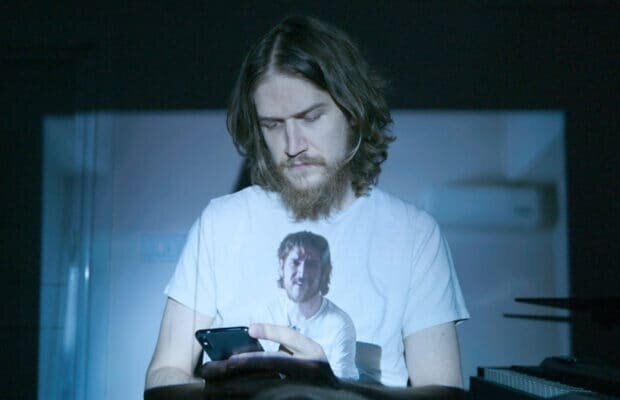As the world began “opening up” this year, I found myself wanting to stay inside more. Suddenly, the prospect of having to interact with other people seems terrifying. Outside of our neighbors (what’s up, Emily?), we haven’t seen many people over the past year. Even a recent trip to see family felt exhausting. It’s been a weird year and some change, and I don’t know that my anxiety will let me jump feet first back into social life, even though it seems a lot of other people are having no trouble with it whatsoever. Really, they maybe should be having some trouble with it, considering how many people in my area aren’t vaccinated.
Just as all these anxieties converged on me, Bo Burnham released Inside, his new comedy special, on Netflix. After seeing a few TikToks about it on my FYP, I figured I needed to check it out. So I grabbed Todd, settled down in a dark living room, and sat perfectly still for the entire runtime in shock.
Daddy made you your favorite, open wide.
Lots of people have talked about Burnham’s special more articulately than I can. While it’s difficult for critics to comment on the way Inside captured the collective heart of the internet, they more eloquently unpack how the special plays with comedy conventions and Burnham’s previous work. What I do know is that Inside has tuned into a very specific part of what everyone’s been feeling for the past year, and specifically what those with mental disability have felt. It’s been a hard time, and no amount of checking in on each other can change that. Inside did what a lot of more positive shows and messages couldn’t. It made me feel like I wasn’t quite so alone in my feelings about the pandemic, or my own personal struggles with social interaction during and after it.
People keep saying it, but the last year has truly been hard, and it’s hit people differently for a variety of reasons. In Inside, Burnham explains that he was contemplating returning to live comedy after a series of panic attacks on stage made him take a lengthy break (sort of—he also directed Eighth Grade somewhere in there). Just as he prepared to make his comeback, the world shut down due to the pandemic, and suddenly he was stuck inside again, this time not of his own volition. Through the progression of songs in Inside, the audience can see a journey of sorts.
Thank you, Socko.
Burnham wrestles with pandemic life in songs like “Facetime with my Mom (Tonight)” and “Sexting.” The songs both deal with the struggle to use technology in order to connect with others. Yes, it’s easier to have a conversation with your mom when her iPhone 5 isn’t inches from her nose. Yes, it is hard to decipher what a ferris wheel means in the context of sexting. However, as the show gradually goes on, Burnham turns introspective, looking at details of his own life. “Look Who’s Inside Again” instantly recalls childhood trauma and bullying, and “Problematic” contemplates Burnham’s past misdeeds. Remember when Burnham tricked an audience into saying the n-word? Yeah, not cool. “Problematic” invites us, the viewer, to hold him accountable for that (though press on the special, to my knowledge, hasn’t).
Perhaps most striking is the second half of the special, where Burnham goes even deeper inward, describing anxiety and depression in “Shit” and “All Time Low.” Really, there’s never been a more apt description of my own anxiety than:
Feeling in my body, way down deep inside me
I try not to fight it (Describe it!) Alright
A few things start to happen, my vision starts to flatten
My heart, it gets to tappin', and I think I'm gonna die.
Burnham punches the viewer with gut wrenching tunes in the latter half of the show, “That Funny Feeling,” and “All Eyes on Me,” both of which give the viewer a feeling that both they and Burnham are patently Not Okay(™). “That Funny Feeling” delves into the total disillusionment people can have with the human race, meshing fun activities with things like “a mass shooting at the mall,” and “All Eyes on Me” addresses Burnham’s experiences with panic attacks and the painful, abject desire to both want attention and want help for feeling overwhelmed by that attention.
Don’t come crying to me, I’m too busy crying to myself.
Humor is the way a lot of people deal with sadness, with grief, with rage. It’s a defense mechanism, and maybe not the healthiest one. I’d be lying if I didn’t make some “well, my mom’s dead” jokes shortly after she passed, just because the sting of the shock made other people gasp in surprise. That sort of reaction makes it hurt less, if even for a quick second. A big part of anxiety, for me, is feeling like I’m abnormal for feeling a heightened sense of panic, that my brain is broken irreparably and I’ll never be “normal,” never pass as someone who doesn’t feel nervous every day. Inside reminded me, for the entirety of its runtime, that I’m not alone in that struggle, and that tons of people experience the same thing.
There are some dark jokes in Inside. I laughingly recommended it to a friend saying, “It’s really funny, but there’s also a Suicide Hotline number at the end!” I’ve read that some people find it difficult to watch, and are only shoved deeper into their own depression because of it. That being said, it’s absolutely a worthwhile watch if you have a slightly dark sense of humor, a love of music, and a need to be seen.





